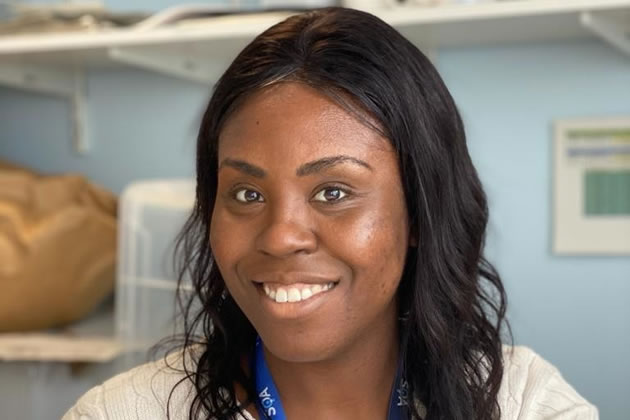Hammersmith Hospital Nurse Has Message for Covid-19 Sceptics
Mina Long-John wishes conspiracy theorists could be shown the reality

Mina Long-John who was given an RCN London rising star award.
“I wish I could bring those people who believe coronavirus is a conspiracy theory into intensive care”, said Hammersmith nurse educator Mina Long-John, who has been busy training staff at the sharp end to cope with the virus.
In her job she has witnessed first-hand the pressures intensive care nurses were under.
“We don’t want to go through this again,” she said.
“We know definitely that things like cleaning and cleaning door handles, wearing your mask when you’re in a shop or when you’re not socially distanced, that kind of thing, on public transport, just always always adhering to this and just being careful with interactions with other people.”
Whilst staff are prepared for any second wave she warned people to take it seriously.
“Some people might think it’s a bit like the common cold, nothing to worry about. I’d love people to come into intensive care and see what goes on,” she said.
And she said people don’t see the images of “tubes in people’s mouths and nurses really fighting to save people”.
“All these people who think it is a conspiracy theory and it doesn’t exist I wish I could just bring them in and say, ‘look it is real’.”
She’s just won a Royal College of Nursing London’s rising star award for her work at Imperial College NHS Trust.
The awards presented at the start of Black History Month recognise excellence in patient care, innovation, and leadership from London’s Black, Asian, and Minority Ethnic (BAME) nursing community . And they saw more entries than ever before as nurses were at the forefront of London’s response to Covid.
Miss Long-John said: “The last six months have been some of the most challenging times nursing staff in London have ever experienced, especially for nursing staff from BAME backgrounds.
“It is a privilege to win because this shows the challenges my BAME colleagues and I have overcome have not gone unnoticed. I hope these awards will bring us a step closer to a future in which no group of patients or staff goes unheard.”
A few months before the pandemic she had started her “dream role” in education based at the trust’s General Intensive Care Unit.
The challenges of coronavirus saw nursing staff challenged and tested as never before and Ms Long-John who worked as an intensive care nurse at Imperial, helped prepare them for new ways of working.
“We were supporting and teaching nurses who came from the ward areas to work in intensive care during surge one,” she said.
“Some staff were scared. They did not know what they were walking into.
“We said ‘we will be with you and the intensive care nurses will be with you’. We did not have any model of a surge.”
But the training team at Hammersmith Hospital did have expertise of infection control to draw on and team work.
“And kindness, that’s a massive thing. For some people that’s all that’s needed.”
She recalled an incident where a doctor’s wife used contacts to send in toiletries to cheer up staff in the midst of coping with huge numbers of coronavirus patients.
“It was just so kind,” she said.
Nurses also “went the extra mile and stayed a bit longer” so colleagues could get a break, she said.
Amongst the new – and physically demanding – skills for many nurses is the technique of “proning” or placing some Covid patients on their stomachs to help them breathe. As they may be attached to tubes, great care is needed and several medics working together.
And Ms Long-John said it might normally be used occasionally at her hospital but it became more commonplace during the crisis.
Clare Leon Villapalos, lead nurse in critical care at Imperial who nominated Mina for the award, said, “During the pandemic surge in intensive care, Mina provided essential, meaningful clinical leadership, to both our substantive staff and to the many redeployed staff in critical care.
“At times we were concerned that some BAME nursing staff were afraid and they might be at more risk, but Mina was absolutely key in providing sound education, listening to people’s fears and leading by example in the clinical setting. I believe her influence, presence and courageous, open, leadership was essential to supporting our staff.”
A Public Health England report in June into the deaths of 119 NHS workers revealed that BAME staff were over-represented.
And she had also noticed the number of BAME patients, many of them men – and some in their 40s – admitted to intensive care before the trend came to light internationally.
“When we lost some people at the trust from Covid we did get a lot of people wanting to know why,” she said.
Imperial did risk assessments and some staff stayed away from Covid areas to protect themselves.
And Ms Long-John explained that sometimes staff coping with the Covid surge just needed someone to talk to.
“I spotted them in the corridor and noticed they were upset. I helped them the best I could. Sometimes it’s just about sitting and listening to what they had to go through. Sometimes that’s the best type of support.”
And should the worst happen again there are plans for quiet rooms for staff to take time out, draw breath and get support.
Julia Gregory - Local Democracy Reporter